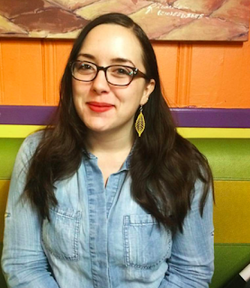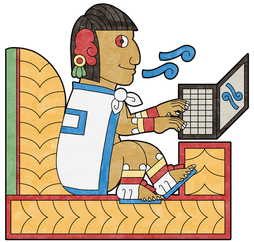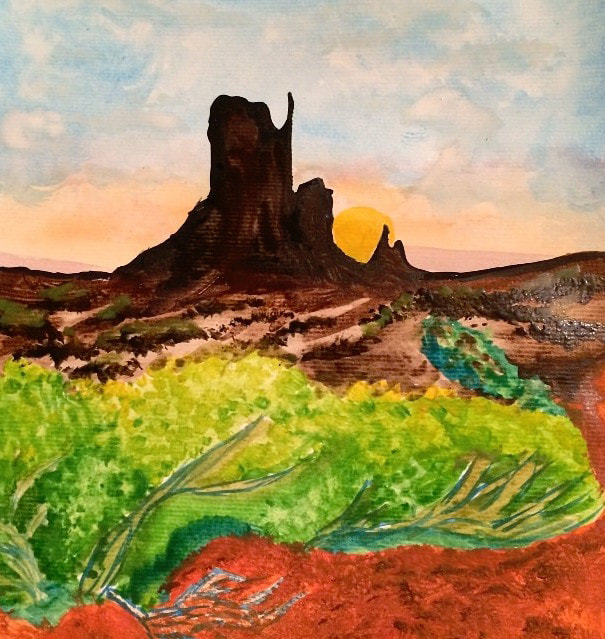Her Name Was MariaBy Em Montoya For Wesley I remember her. Great-grandmother, curled up beneath a hand-crocheted afghan, pursing her lips. Her gray white hair short and swept aside. Nearly a decade after her passing, I could not remember her name. What does it mean when you forget her name? Her, curled up on the small armchair. Her, with her long, bony, beautiful hands. Her, with her repetitions. She was always Great-grandmother, nicknamed Grandma-grape, not known to me by the name she carried her entire life. She is beautiful behind my closed eyes, small, her hands knotted, and worn. When she was young she kept her hair coiffed in pin-curls. She wore red lips and dressed in smart, tailored, black clothing. She raised a swarm of daughters. All dark haired, and brown eyed. Even in her old age, she had such grace between the lines of her face, her olive skin, brown eyes strong. Great-grandmother’s room was blushed with floral blankets and pink walls. A vanity with delicate glass perfumes. My Grandmother would bathe her, dress her, tuck her in at night. She’d comb her white hair, dress her in warm sweaters—just as she had done for her when she was small. I spent my childhood secluded, away. My father’s feud with my Grandmother’s husband kept us isolated. I only knew my Grandma when I was older, ten, twelve. High School. I learned family. I struggled. A small child in a small life, with two parents in a cold apartment, with only her toys to keep her company. I treasured the one thing I had from my Great Grandmother — a porcelain angel, one that I remember handed to me once on a sunny day when I was four years old. Her smiling down at me as she handed me the glass figure. It wasn’t until I was much older, that I found it again, and read the words etched into the ribbon wrapped around the base that I realized it was a glass figurine from my cousin’s baptism—not a gift to me, but a gift from the family to honor my cousin’s birth. I had never been baptized, or honored, or felt their presence at school recitals. No group to greet me from the crowds, just the figure of my Mother, her pale face and blue eyes, shining at me from the seats. The cushioned recliner in my Grandmother’s living room was solely Great-grandmother’s, and it was there that she sat among the family, watching television, repeating in her frail voice, “Do you get it? Do you get it?” Over, and over, in a melody that rendered both familiarity and confusion. One by one as cousins we’d file inside and it was our custom to greet her first. Bend down, let her look at us. Sometimes she would touch my face, or kiss my cheek. Sometimes I was a stranger and she would merely look away. She loved the men the most, my male cousins. I think perhaps because she had so many male grandchildren, and that she believed their sons were still her grandbabies, still young, and little. Forever children. I still don’t think she ever saw me. Her beautiful dark eyes, looking but not seeing. I was faceless, someone she could not place a name to or a memory—someone who looked like her Grandson, but was a young lady. I was afraid to be alone with her. I was just a child, and I didn't understand why she didn't recognize me, why she didn't talk. Through the filmy gauze of memory, I can recall not the words, but the images that they built in my mind. Half-renderings of pink table cloths, and porcelain rabbits. Crystalline centerpieces. Once at the dining room table, I sat with my grandmother and father over tea. I was only a child. I soaked up their stories. My Grandmother told me of her Mother’s journals. Written by hand, in slanted cursive, in Spanish. She wished to read them one day—her ability to read Spanish had slipped away with time. She had not passed on the language, and the words for me then were like hieroglyphs. She spoke of wanting to have them translated, preserved. Kept alive. She told me a story. My mind filled in the gaps. The New Mexican heat burned on her skin. They’d walked for miles, suitcases in hand. The brown leather rich, and scalding to the touch beneath the sun. She loved him, her now husband, her Ramon. He had nothing, and her family had everything. They stole away together in the night. They fled beneath the cool New Mexican moon. Married in a small chapel, they were bound. It was somewhere in the twilight, where light crept up to meet the night and the last of the fire flickered in the small table lamp, that they found one another. The cool blue sky began to change colors along the horizon, where the hills, expanded across the sky in dark smudges were aglow with light. The animals barely stirred the blue oatgrass. The fear settled in on the road, crept down her spine. When they reached the gate, she saw him, her father, standing in the doorframe. A silhouette in the shade. It wasn’t until the suitcase sat in the dirt, coated, and she lifted the metal latch of the gate and walked inside, that she saw it: the long smooth wood of his rifle. “How do you come?” he said. Ramon moved to her side. She jumped at the damp touch of his palm, but calmed when his fingers laced with hers. Her father stepped into the light. His forehead creased at his brow. “How do you come?” He repeated. She held her breath. His voice boomed inside of her head. She did not know how to respond. The silence seemed to pull at her insides, twisting them up. “We are wed,” Ramon said. Her father never looked at him, he stared only at her. “We are wed,” she repeated under her breath. Her father disappeared into the house, and the sun slipped behind the clouds, casting shadow over the hillside. Each Christmas Eve we’d gather over steaming bowls of pozole, heated tortillas drenched in rich butter. We’d gather around two tables with hands held side by side, and once... Great-grandmother—as if from instinct or old memory—began reciting the Lord’s Prayer in Spanish. The room fell silent, our hearts thudding with the honor, the rare precious moment of her voice that washed over us like song. Padre nuestro, que estás en el cielo. Santificado sea tu nombre. Venga tu reino. Hágase tu voluntad en la tierra como en el cielo. Danos hoy nuestro pan de cada día. Perdona nuestras ofensas, como también nosotros perdonamos a los que nos ofenden. No nos dejes caer en tentación y líbranos del mal. Amén. I can still hear her saying: “Do you get it?” And I don’t know if I got it. I don’t think I understood then, what it was like to live inside a body with a mind slipping away. To exist like a ghost in one’s life. A stranger to oneself. A representation of Great-grandmother. Existing and not existing. Like a legend inside my Grandmother’s house, which was full of old black and white photos, bone china with delicate flowers, deep green carpet, and orange countertops. Somewhere among the paisley, the bread machine, the soft wool blankets and hidden ashtrays in the sunroom, I found her. She never spoke, beyond those four words, until she did. And it was magic. Eventually, I asked my cousin for her name and I asked my aunt if I could read her diaries, so I could find a way back to her. “She had no diaries,” my aunt said. Were they lost? Had they slipped away with time? But I remember. She did have diaries. I remember the story. And her name was Maria.  Em Montoya is an artist and writer of speculative fiction and creative nonfiction centered around memory, ancestry, family, and the symbolism of home. She received her MFA in Fiction from St. Mary's College, Moraga, in Spring of 2016 and is now working on her dual-emphasis, focusing on Nonfiction with a collection of essays entitled All The Little Houses, and works as an Assistant Editor for "Somos en escrito, The Latino Literary Online Magazine." Two of her watercolor paintings will be on display at Sanchez Contemporary's Flora and Fauna exhibit in January 2017. This is her first published work.
0 Comments
Your comment will be posted after it is approved.
Leave a Reply. |
Archives
April 2024
Categories
All
|
Donate and Make Literature Happen
is published by the Somos En Escrito Literary Foundation,
a 501 (c) (3) non-profit, tax-exempt corporation. EIN 81-3162209



 RSS Feed
RSS Feed